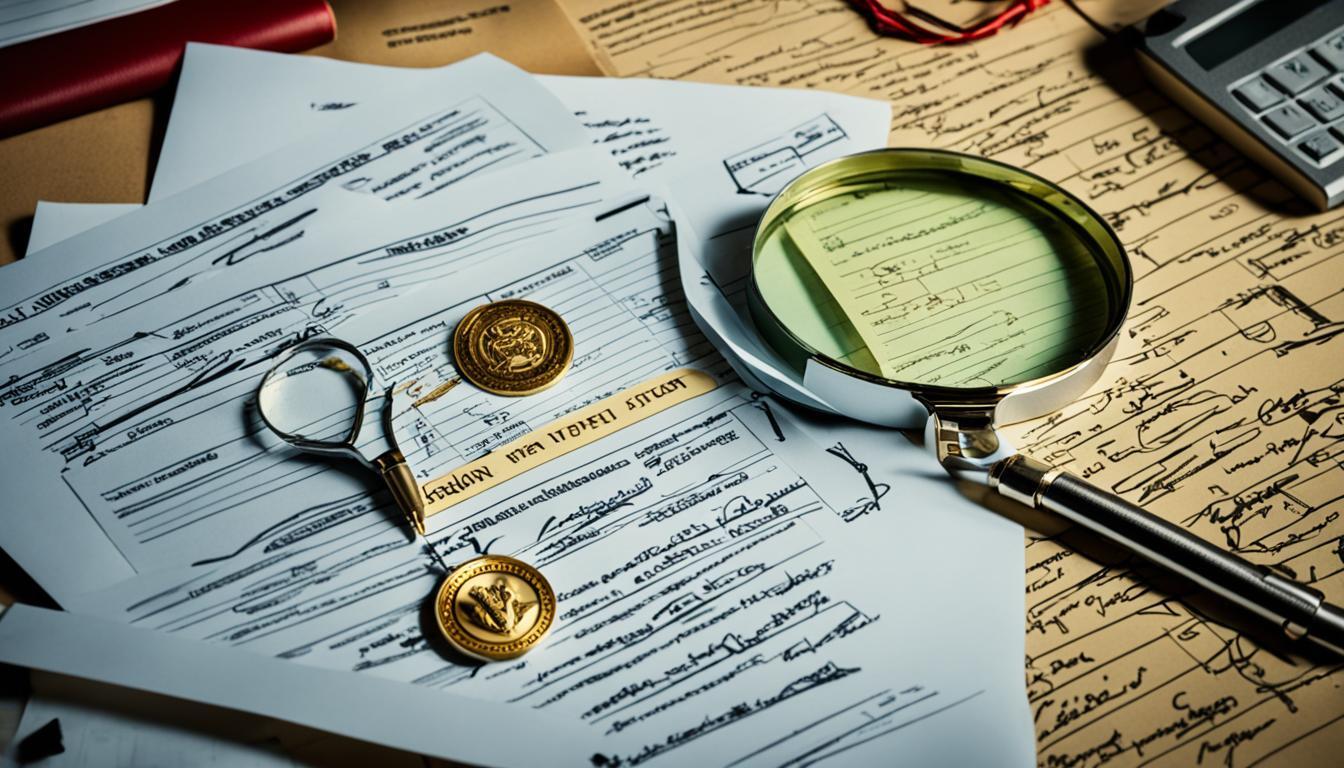Become a Private Investigator: A Step-by-Step Guide
Did you know that the private investigation industry in Canada is growing rapidly? According to recent statistics, the demand for private investigators is expected to increase by 11% over the next five years.
If you have a passion for solving mysteries and uncovering the truth, becoming a private investigator could be the perfect career path for you. In this comprehensive guide, I will walk you through the steps to become a private investigator in Canada, from the necessary qualifications to obtaining a license.
Key Takeaways:
- Private investigation is a growing industry in Canada, with an expected 11% increase in demand over the next five years.
- A career as a private investigator offers the opportunity to solve mysteries and uncover the truth.
- Obtaining the necessary qualifications and obtaining a license are key steps to becoming a private investigator.
- Continuing education and staying updated on industry standards are essential for success in this field.
- Requirements for becoming a private investigator may vary by province, so it’s important to research the specific regulations in your area.
Understanding the Role of a Private Investigator
Private investigators play a crucial role in conducting investigations on behalf of individuals, businesses, and government agencies. They possess a diverse set of skills and responsibilities to uncover information, gather evidence, and assist clients in various legal and personal matters.
Private investigators are often tasked with conducting surveillance, finding missing persons, providing personal and financial data, and conducting thorough investigations. Their work involves gathering evidence for legal cases, investigating criminal activity, and analyzing complex situations to provide valuable insights.
In addition to their investigative duties, private investigators also have the responsibility to meet with clients, listen to their concerns, and provide guidance based on their expertise. They must maintain confidentiality and professionalism throughout their interactions, ensuring that the clients feel supported and informed throughout the investigation process.
Private investigators must possess a deep understanding of the laws and regulations related to their profession. This knowledge is crucial to ensure that their investigations are conducted ethically and within the boundaries of the law. They must also stay updated on the latest industry practices and technological advancements to enhance their effectiveness and efficiency in solving cases.
Overall, private investigators have a diverse range of responsibilities and play a vital role in assisting individuals and organizations in uncovering the truth and finding resolution in complex situations.

| Private Investigator Job Outlook | Private Investigator Responsibilities |
|---|---|
| Steady demand for private investigators due to the ongoing need for legal and investigative services | Gathering evidence for legal cases |
| Growing demand from individuals and businesses for specialized investigative services | Investigating criminal activity |
| Increase in cybercrime and the need for digital investigation expertise | Conducting surveillance |
| Opportunities in niche areas such as insurance fraud, background checks, and corporate investigations | Locating missing persons |
| Employment opportunities in both private investigation firms and government agencies | Providing personal and financial data |
Educational Requirements
While there are no specific educational requirements to become a private investigator, having a degree in criminal justice can be beneficial. A high school diploma or equivalent is typically the minimum requirement. Some states may require a criminal justice degree or specific classes for licensing.
Additionally, there are training programs and courses available to gain the necessary skills and knowledge for this field. These programs cover a wide range of topics such as investigative techniques, surveillance methods, legal regulations, and ethical considerations.
If you’re considering a career in private investigation, obtaining a degree or enrolling in training courses can provide you with a solid foundation in the field and improve your job prospects.
Benefits of Private Investigator Training
Private investigator training programs offer comprehensive instruction on various aspects of the profession. These programs are designed to provide aspiring investigators with the skills and knowledge needed to excel in their careers.
Some of the benefits of private investigator training include:
- Acquiring practical investigative skills: Training programs offer hands-on experience and teach practical skills such as conducting surveillance, gathering evidence, interviewing witnesses, and analyzing information.
- Understanding legal and ethical guidelines: Private investigators are required to adhere to strict legal and ethical standards. Training programs cover topics such as privacy laws, evidence handling, and professional ethics to ensure investigators operate within the boundaries of the law.
- Networking opportunities: Training programs often provide opportunities to connect with experienced investigators and industry professionals. Networking can be invaluable for finding job opportunities and gaining insights into the field.
- Staying updated on industry trends: The field of private investigation is constantly evolving. Training programs ensure investigators stay current with the latest investigative techniques, technological advancements, and industry best practices.

| Pros | Cons |
|---|---|
| Enhances your skills and knowledge in the field | No guarantee of success or job placement |
| Increases job prospects and opportunities for advancement | Additional time and financial commitment |
| Provides networking opportunities | May not be necessary for entry-level positions |
| Ensures compliance with legal and ethical guidelines | May vary in quality and credibility |
Skills Needed to Become a Private Investigator
As a private investigator, having the right skills and qualities is essential for success in this field. Here are the key skills that aspiring private investigators should develop:
- Problem-Solving: Private investigators must possess strong problem-solving skills to effectively gather evidence, analyze information, and solve complex cases.
- Patience: Patience is crucial in the field of private investigation. Investigators may need to spend long hours on surveillance, wait for the right moment to gather evidence, or follow leads diligently.
- Communication Skills: Excellent verbal and written communication skills are essential for private investigators to interview witnesses, gather information, and prepare detailed reports.
- Decision-Making: Private investigators often face situations that require quick decision-making. The ability to make informed decisions under pressure is essential in this profession.
- Critical Thinking: Private investigators must possess strong critical thinking skills to assess situations, analyze evidence, and make logical conclusions.
- Initiative: Taking initiative is important for private investigators to actively pursue leads, gather information, and solve cases effectively.
- Computer Skills: In today’s digital age, private investigators need to have a good understanding of computer systems, online databases, and digital surveillance techniques.
Developing these skills will help aspiring private investigators excel in their careers and handle the challenges that come with this profession.
| Skill | Description |
|---|---|
| Problem-Solving | Private investigators must possess strong problem-solving skills to effectively gather evidence, analyze information, and solve complex cases. |
| Patience | Patience is crucial in the field of private investigation. Investigators may need to spend long hours on surveillance, wait for the right moment to gather evidence, or follow leads diligently. |
| Communication Skills | Excellent verbal and written communication skills are essential for private investigators to interview witnesses, gather information, and prepare detailed reports. |
| Decision-Making | Private investigators often face situations that require quick decision-making. The ability to make informed decisions under pressure is essential in this profession. |
| Critical Thinking | Private investigators must possess strong critical thinking skills to assess situations, analyze evidence, and make logical conclusions. |
| Initiative | Taking initiative is important for private investigators to actively pursue leads, gather information, and solve cases effectively. |
| Computer Skills | In today’s digital age, private investigators need to have a good understanding of computer systems, online databases, and digital surveillance techniques. |
Work Experience and Training
When it comes to becoming a private investigator, work experience and training are essential. These factors contribute to your overall knowledge, skills, and expertise in the field. Let’s delve into the details of how work experience and training can shape your career as a private investigator.
Work Experience
Having a background in law enforcement or the military can provide you with valuable experience and training in various investigation techniques. These professions equip you with essential skills such as attention to detail, critical thinking, and problem-solving, which are highly relevant in the world of private investigation. The hands-on experience gained from working in these fields can give you a solid foundation to build upon.
Additionally, working in a related field such as security or loss prevention can also be advantageous. These roles allow you to develop skills in surveillance, risk assessment, and evidence collection, which are integral to the work of a private investigator. By gaining experience in these areas, you can enhance your credibility and effectiveness as a professional investigator.
Training Programs
While practical experience is crucial, formal training programs can provide you with the necessary knowledge and expertise to excel in the field of private investigation. Various training programs and courses are available to equip you with the essential skills required for this profession.
These training programs cover a wide range of topics, including investigative techniques, surveillance methods, legal procedures, and ethical considerations. They are designed to enhance your understanding of the industry and equip you with the tools to effectively carry out investigations while adhering to legal and ethical standards.
Private investigator training programs not only provide classroom education but also offer practical exercises and simulations to help you apply what you’ve learned. These hands-on experiences enable you to sharpen your skills and gain confidence in real-world scenarios.
Continuing Education
As in any profession, continuing education is crucial for private investigators. Staying updated on the latest trends, technologies, and legal requirements in the field is vital to maintaining your competence and credibility. Ongoing education ensures that you remain well-informed and well-equipped to handle the evolving challenges in the investigative landscape.
Continuing education can take various forms, including attending workshops, seminars, and conferences, as well as pursuing advanced certifications or specialized training. By investing in your professional development, you can enhance your skills, expand your knowledge base, and stay ahead in the dynamic field of private investigation.
Developing a combination of work experience and training is key to a successful career as a private investigator. It equips you with the necessary skills, knowledge, and expertise to excel in this demanding profession.
Obtaining a Private Investigator License
To become a licensed private investigator in Canada, you must fulfill certain requirements set by your province. These requirements generally include passing an examination that covers topics such as surveillance techniques and investigative methods. Additionally, a background check may be required to ensure your suitability for the profession. Once you have met the licensing requirements, you can proceed with the private investigator license application process.
To apply for your private investigator license, you will need to submit the necessary application form and pay the applicable fee. The licensing authority in your province will provide the specific forms and instructions on how to complete the application. It is important to carefully follow the instructions and provide all the required information.
Once your application has been received and reviewed, the licensing authority will determine whether you meet the criteria for licensure. This process may take some time, so it is important to submit your application well in advance of when you intend to start working as a private investigator. If your application is approved, you will receive your private investigator license, allowing you to legally practice in your province.
It is crucial to note that private investigator licensing requirements and processes may vary among provinces in Canada. Therefore, it is essential to research and understand the specific requirements of the province in which you plan to work. This will ensure that you meet all the necessary criteria and complete the application accurately and efficiently.
| Province | Licensing Requirements | Application Process |
|---|---|---|
| Ontario | Completion of mandatory training program Passing the licensing examination Proof of liability insurance | Submit application form with required documents Pay licensing fee |
| British Columbia | Completion of approved training program Passing the licensing examination Proof of liability insurance | Submit application form and supporting documents Pay licensing fee |
| Quebec | Completion of qualifying training program Passing the provincial exam Proof of liability insurance | Submit application form and required documents Pay licensing fee |
Pursuing a Private Investigator Career in Canada
If you are considering a career as a private investigator in Canada, it’s important to be aware that the requirements can vary depending on the province where you wish to work. Each province has its own specific regulations and licensing requirements that must be met.
One important aspect of becoming a private investigator in Canada is obtaining the necessary certification. In most provinces, certification is a requirement and involves completing a training program approved by the licensing authority. These programs provide aspiring investigators with the knowledge and skills necessary to succeed in the field.
To ensure that you meet all the necessary requirements, it is crucial to thoroughly research the specific regulations for the province in which you plan to work. This will help you understand the training and certification process and any additional requirements that may exist.
Adhering to ethical standards and legal guidelines is a fundamental aspect of the private investigator profession. It is essential for investigators to stay updated on industry standards and best practices to ensure they provide reliable and ethical services to their clients.
- The Role of Police in Community Safety & Unity - October 6, 2025
- Quebec Police Officer Salary Insights 2023 - July 13, 2025
- Canada Arrest Protocol: What Police Say Upon Arrest - June 12, 2025




















Post Comment